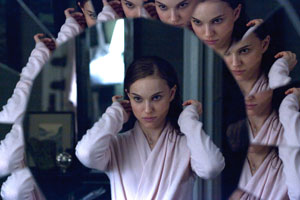Darren Aronofsky’s ballet movie ‘Black Swan’ luxuriates in weirdness. Wow
ARNOLD WAYNE JONES | Life+Style Editor jones@dallasvoice.com
4 out of 5 stars
BLACK SWAN
Natalie Portman, Mila Kunis,
Barbara Hershey, Vincent Cassel.
Rated R. 105 mins.
Now playing at the Magnolia and the Angelika Film Center–Plano
…………………………..
Based on my vast inside information about the behind-the-scenes world of professional ballet — which I have culled exclusively from watching The Turning Point, The Company, parts of Fame and now this film, Black Swan — not much about dance has changed over 35 years, at least in New York City. Dancers still live in cramped walk-ups and take the 3 train from Lincoln Center to TriBeCa (or worse, the NRW to Queens) and exit only at ill-lit and ominous stations. They still wear leg-warmers and wrap their gnarled feet in worn slippers. The corps is always led by a shriveled Russian crone, her silver hair pulled tight into a ponytail, her wattle buried behind chunky jewelry. There’s also always a priggish, demanding European choreographer-artiste, possibly the only straight man in all of dance who belittles then sexually exploits every new ballerina.But there’s also always one tortured aspirant, whose drive and talent are her salvation and her undoing.
Yes, in the first half hour of Black Swan, director Darren Aronofsky and writers Andres Heinz, Mark Heyman and John J. McLaughlin, don’t miss a single cliché either visually (uppity versions of Flashdance) or plot-wise. And then something remarkable happens: The film becomes Hitchcockian — or rather, early Polanski, who stole from Hitch better than anyone, and delves into areas of insanity and fantasy you don’t expect. It doesn’t erase all that came before it, but it leaves you with an unsettled feeling that’s difficult to shake.
Natalie Portman has rarely impressed me onscreen. The Star Wars films didn’t challenge her (and she didn’t disappoint, never rising above the ho-hum scripts and stodgy dialogue), and her stripper in Closer struck me as entirely false.
But here, as Nina — the tic-filled prima donna desperate for success but too repressed to explore the part of her that will allow her to triumph — Portman seems to fit like a foot in a ballet shoe.
Nina craves center stage, and she’s got talent, but she’s also troubled. Her mother (Barbara Hershey), once a dance hopeful, smothers her with expectations; Tomas (Vincent Cassel), the company’s leader, intimidates her; competition from the other girls is fierce, and Nina wants for confidence.
But there’s something deeper holding her back, too: She’s paranoid (or is it just overly sensitive?), sensing every overheard titter is cruel mockery aimed at her; she’s obsessed with her body and a rash (or is she self-mutilating?); she sees dangers around every corner, including the fading diva (Winona Ryder), whom she’s in line to replace. And what of Lily (Mila Kunis), the newcomer who acts like her friend and possible lover, but could be pulling an Eve Harrington on her?
It’s difficult to tell what to believe in the world Aronofsky creates; maybe that’s why he echoes so many dance-movie clichés, to get us relaxed in the familiar before he turns out the lights. (Surprisingly, there are some standout special effects.) Like Polanski’s Repulsion and The Tenant — and more recently, Jacob’s Ladder — what we know is filtered through Nina’s mind. It’s never clear what we should trust. Does her mother even exist? Minor things become ominous: He turns the acts of hand-washing and fingernail-clipping into moments of intense terror, with too many bloody digits for my taste.
But to what end? Black Swan is difficult to parse. It’s creepy — a true thriller — that stays self-contained in the world of ballet.
Cassel delivers the film’s most predictable performance (he’s completely uninteresting), but Kunis reveals strength as an actress with a layered turn, and it’s nice seeing Hershey given a juicy role. (If Carrie ever tried to dance, her mom might look like Hershey’s, who elevates passive-aggression to high art.)
But, aside from Aronofsky, the film belongs to Portman. She’s brilliantly unbalanced, portraying a descent into insanity that is horrifying and unnerving but also rooted in humanity and frailty.
The disconnect between the predictability of the dance-driven aspects and the horror of what follows may cause Black Swan to struggle to find an audience. It’s not really a chick flick, but its esoteric discussion of ballet won’t exactly pull teen males into the multiplex. All the more reason to check it out during the crowded holidays — the gays can have the auditorium to ourselves.
This article appeared in the Dallas Voice print edition December 3, 2010.

















